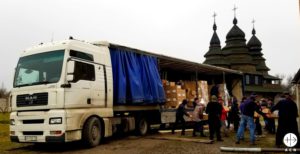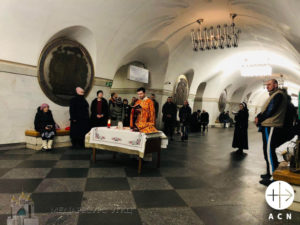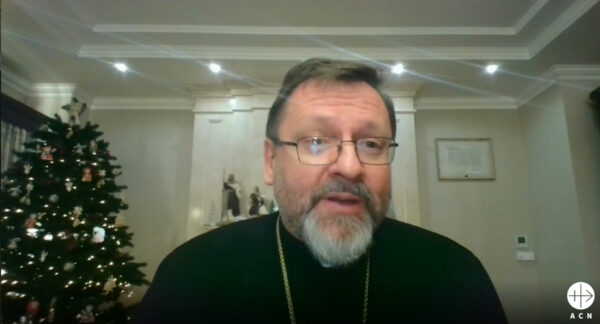Ukrainian Catholic Church stands with the displaced, the poor and the sick: «When people have a problem, they first turn to a priest.»
ACN – The Catholic Church in Ukraine is helping the population to overcome the traumas caused by almost nine years of war in the east and a year of large-scale invasion and attacks throughout the country.
At an online conference organized by the pontifical foundation Aid to the Church in Need(ACN), Major Archbishop Sviatoslav Shevchuk, head of the Ukrainian Greek Catholic Church, has communicated his intention to train priests who know how to recognize and treat psychological and physical problems.
«From the Church people expect food and clothing, but also a word of hope. Pastoral care of the people is our number one mission: above all, to heal people’s wounds. Almost 80% of Ukrainians need help to overcome their psychological, physical and other traumas. Our task as the Church is to help heal the wounds of our nation,» the major archbishop said.
Of course, in a normal situation, these issues could be left to other professionals, but there is a historical reason why this is not easy in Ukraine. «Ukrainians are afraid to seek psychological help, because in the Soviet Union psychology was used as a tool of state repression. When people have a problem, they first turn to a priest. Therefore, we must prepare priests for this kind of spiritual counseling. It is the first step towards any other kind of clinical or psychological help.»
During the past year of the war, the Church has been sending victims abroad in order to receive specialized treatment and rehabilitation, but the needs are now so great that it is necessary to obtain the means to do this in Ukraine, preferably with a specialized center in each diocese. During the conference, ACN CEO Thomas Heine-Geldern assured of the foundation’s support in addressing this issue and, as far as possible, taking it on as a project.

Catholic priests detained or expelled
Archbishop Visvaldas Kulbokas, apostolic nuncio in Ukraine and also present at the conference, mentioned some of his main concerns at the moment, especially in the regions occupied by Russia or close to the front line. «What worries me the most are the people living near the front line, who are constantly shelled. I have been told that, when they visit the frontline regions, they find our Catholic priests there more depressed and more tired.»
During the conference, it was pointed out that there are regions without priests. There are three large areas without Catholic priests: occupied Donetsk, occupied Lugansk and part of the Zaporiyia region, which is also under occupation. This is a larger area than Croatia, without a single Catholic priest working, because they were arrested, expelled or unable to continue working.
Two priests, Ivan Levytsky and Bohdan Heleta, were captured by Russian forces on November 16 and are accused of leading the resistance in the occupied town of Berdiansk. Despite constant efforts, the Church has not been able to secure their release, and there are fears that they are being tortured, Major Archbishop Shevchuk acknowledged.
«We have not received any official information about our priests or other people in Russian prisons. We only get information from people who shared a cell with them and who regained their freedom: it is they who inform us how and where they are. This is how we can at least be sure that they are still alive, and we can continue to work for their release.»

Mediation by the Pope
Direct communication with the Russian authorities is not possible, but the leader of the Ukrainian Greek Catholic Church – the largest Catholic Church in the country, and the third largest Christian confession after the two Orthodox Churches – explained during the conference that diplomacy is the safest bet and that Pope Francis has been a key player here: «We are very grateful to all Ukrainian diplomats, but above all to Pope Francis for his mediation to rescue prisoners and hostages of war. It is not an easy task.»
Each time he visits a parish, the senior archbishop explained, he gathers information from residents about their relatives held as prisoners of war. The Church sends a list of names to the Vatican, and Pope Francis makes sure to get it to the Russian embassy. Many have already been released in this way.
«Ukrainians usually criticize anyone who has a relationship with Russia, but we are very grateful to Pope Francis and the Holy See for maintaining contact with the Russian side, because without that we would not be able to rescue anyone,» Sviatoslav Shevchuk assures us.
Millions of displaced and residents without electricity
Meanwhile, the Church continues to assist as many as it can with aid, much of it provided by ACN: in the first year since the full-scale invasion, Aid to the Church in Need has helped fund over 200 projects with more than 9.5 million euros, and more than 15,000 people have benefited directly from this aid.
In addition to the seven million people who have fled the country, there are some eight million internally displaced persons. The winter is being particularly harsh, Major Archbishop Shevchuk explained. «At first, people were moving to the west of the country, but the poorest, who are unable to do so, are looking for the nearest safe city to take refuge in.»
Those who have been able to return to their homes face many difficulties. «Almost half of the occupied territory has been liberated, but those who return find destroyed cities and non-existent infrastructure. Many people are returning, but they have no electricity and no means to survive. Russia is systematically bombing critical infrastructure: 50% of the electricity grid is destroyed.»
Prayer through deeds
In this context, Archbishop Visvaldas Kulbokas explained how much the help given to the needy, such as that of ACN, is appreciated: «During a war like this, everything that ACN, benefactors and journalists do is very important both from a material and spiritual point of view, because it means closeness, empathy and love. It is prayer through deeds.
«We feel your presence, your closeness. Your prayers are working miracles: every week I hear stories about miracles in conflict zones. Prayers and works of charity are very valuable,» the nuncio assures.
And a miracle is just what Major Archbishop Shevchuk is hoping for. Thus, at the end of the conference he expressed his hope that this will be the year when the war ends. «Is it realistic? Maybe not, but miracles do happen.»


